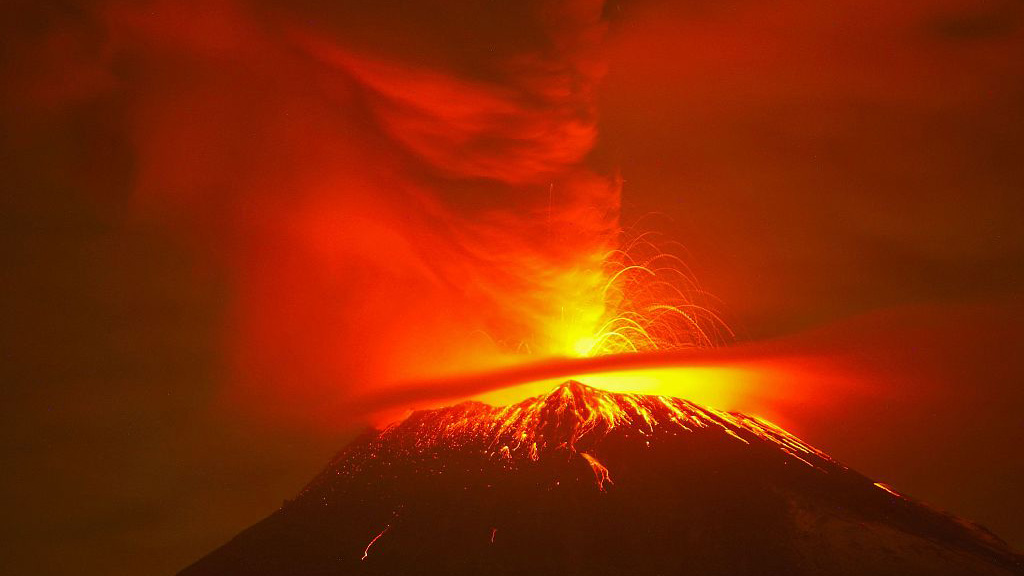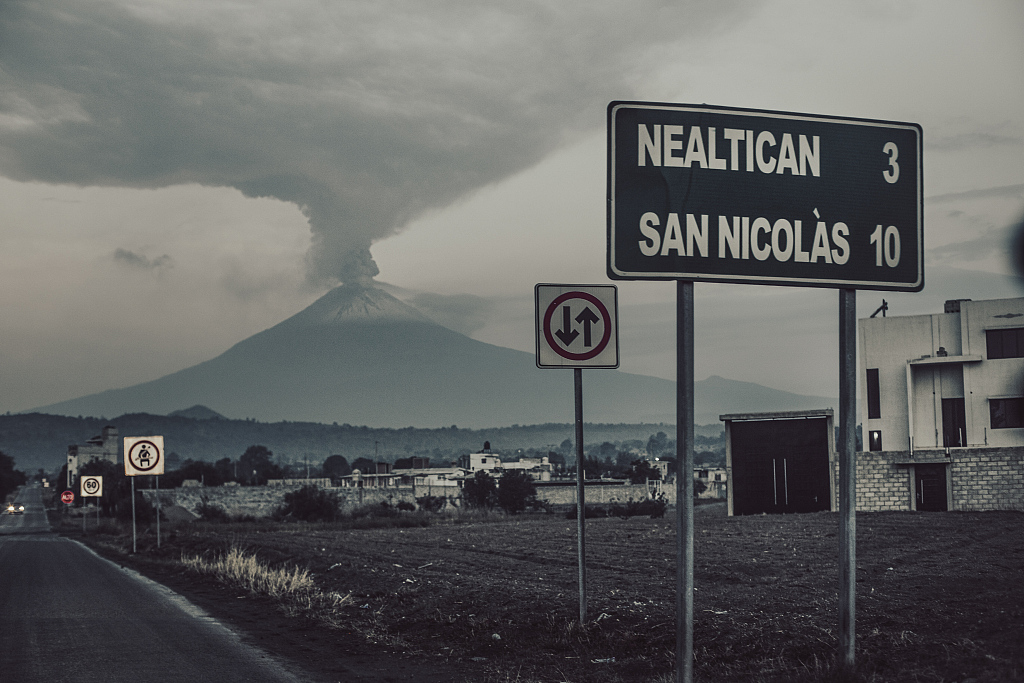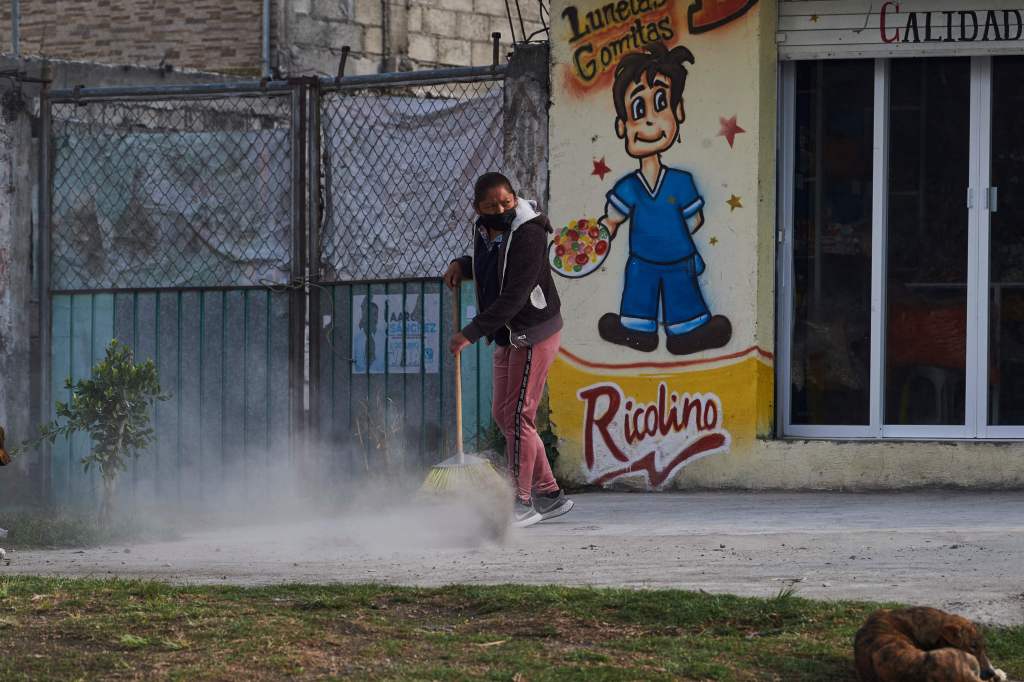
Spewing ash, gas and lava from the Popocatepetl volcano, seen from the San Nicolas de los Ranchos community, state of Puebla, Mexico, on May 23, 2023./CFP
Spewing ash, gas and lava from the Popocatepetl volcano, seen from the San Nicolas de los Ranchos community, state of Puebla, Mexico, on May 23, 2023./CFP
A couple of hours from one of the world's largest cities, the Popocatepetl volcano has been coating nearby towns with ash and disrupting flights at Mexico City's airport, the busiest in Latin America.
Sitting in the eastern half of the Trans-Mexican volcanic belt, the Popocatepetl volcano is 70 km southeast of the Mexico City, and there are approximately 25 million people who live within 60 miles of the mountain.
Hundreds of explosions have spit lava from the snow-tipped peak. Volcanologists say that, while a massive eruption doesn't appear imminent, eruptions are likely to continue, as they have for three decades.
The active volcano
There has been a surge of activity since 1994 at the volcano affectionately known as "Popo," which is being tracked by scientists at Mexico's National Autonomous University (UNAM).
It has had periods of intense activity between 2000 and 2003, and again between 2012 and 2016. In 2000, that activity triggered a red alert and evacuations before the volcano calmed down again.
In past weeks, the volcano entered another one of those periods. Spewing ash, gas and lava, authorities have increased the alert to the yellow, second level on a stoplight-style scale, but not yet to red.
Previous surges in activity date back centuries. Pre-Hispanic writings speak of intense activity at Popocatepetl at the beginning of the 16th century.
In Guatemala, the active stratovolcano Volcán de Fuego, Spanish for "Volcano of Fire," claimed the lives of hundreds of people in a 2018 eruption. It has recently prompted evacuations for heightened activity as well.

The Popocatepetl volcano spewed ash and smoke on Wednesday, May 24, 2023. /CFP
The Popocatepetl volcano spewed ash and smoke on Wednesday, May 24, 2023. /CFP
"Nothing new or surprising"
Scientists and Mexican authorities say there's no sign that the current waves of small eruptions at Popocatepetl will turn into anything more destructive, said Servando de la Cruz Reyna, a senior geophysics researcher at the UNAM in Mexico City, adding that is there "nothing new or surprising" about recent movements.
"The probability that this continues as it has previously is far higher than the probability that this grows to much higher levels," he said.
Popocatepetl has been active for a half-million years. Its last major eruption happened more than a thousand years ago.
Authorities have closed schools in dozens of municipalities across three states, put troops on alert, prepared shelters and checked evacuation routes. Other than that, they are encouraging people to remain calm.
On Monday, Mexican President said in his morning briefing that "the movements of the volcano are being monitored 24 hours a day."
The good side
Popocatepetl's recent activity is not necessarily a bad thing, said Robin Campion, a volcanologist at the Institute of Geophysics. The scientist explained that small explosions alleviate pressure from magma inside the mountain, and likely mean that it won't lead to a buildup and larger eruption.
"The good thing is that … it's constantly releasing energy," Campion said. "Hopefully, it'll continue being as constant and moderate as it is, so it doesn't all erupt at once, like it did in prehistoric times."
As it continues puffing, ash could eventually become a problem in surrounding areas, particularly in the 7.5 miles surrounding the volcano, but also in Mexico City.
While the ash is not toxic, Carlos Valdés, head of UNAM's National Seismological Service, said it could affect breathing and air quality, and also continue to affect flights to and from Mexico City's international airport.

A resident was cleaning ash spewed by the Popocatepetl volcano, in the Santiago Xalitzintla community, state of Puebla, Mexico, on May 24, 2023. /CFP
A resident was cleaning ash spewed by the Popocatepetl volcano, in the Santiago Xalitzintla community, state of Puebla, Mexico, on May 24, 2023. /CFP
While the ash continues to billow toward southern Mexico, he and other scientists monitoring the volcano expect winds to shift and blow ash into the capital in June.
Already on Saturday, volcanic ash carried in by shifting winds forced the city's airport to temporarily shut down. Others expressed worries that the weight of ash building up could collapse precariously constructed homes in poorer areas of Mexico.
He and other scientists recommended residents wash their eyes and wear face masks.
"It has had important consequences. The only danger we're really entertaining right now is the ash," he said. "People shouldn't be scared, more than anything they should take precautions."
(If you want to contribute and have specific expertise, please contact us at nature@cgtn.com.)
Source(s): AP